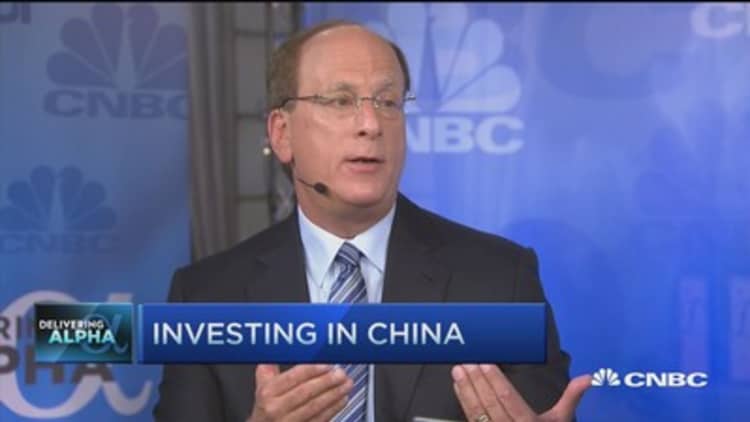After years of betting on China's booming economy and growing middle class, some Western firms may now feel the pinch as a slide in Chinese shares threatens to hurt consumer confidence in the world's second-biggest economy.
China's benchmark stock market, which surged more than 100 percent between October last year and June, has since shed 25 percent of its value in a violent sell-off that forced Beijing to step in with a number of supportive measures.
"The scale of the falls in share prices has raised concerns and client questions about Western companies' exposures to China," analysts at research firm Credit Sights said in a note published Tuesday. "Sharp falls in share prices could dent consumer spending through the wealth effect."
The benchmark Shanghai Composite index slid 3 percent on Wednesday, with better-than-expected Chinese economic growth numbers failing to impress investors. The Chinese economy grew 7 percent in the second quarter from a year earlier, a touch better than expectations.
Read More 'Hard won' China Q2 growth prompts new data questions
Taking a gamble
According to CreditSights, gaming companies with operations in Macau have the most significant exposure to China in the leisure and lodging sector.
"Macau casinos largely source their customers from mainland China, which makes Wynn Resorts the name with the most significant exposure," the CreditSights report said.
"Nearly 70 percent of revenue, on a reported basis, is derived from the Macau casino. This probably underestimates their true exposure to China, since Chinese nationals are a significant minority of its customers to the Las Vegas casino as well."

The Macau casino market has been undermined by a slump as affluent Chinese cut back on gambling. That's hurt Wynn Resorts, which has seen its share price tumble almost 30 percent so far this year.
Since the bulk of investors in Chinese shares are made up of retail investors as opposed to big institutions, the sharp selloff could have implications for consumer spending and undermine Beijing's efforts to shift the economy away from investment towards consumption, analysts say.
"I'm concerned about China's medium-term growth prospects, that debt is still rising faster than nominal GDP (gross domestic product) and that the very nature of China's growth tilted towards investment is deflationary," Richard Iley, emerging markets chief economist at BNP Paribas, told CNBC Wednesday.
"Having said that, there's still scope for monetary policy to support the economy."
Meanwhile, Walt Disney Chairman and CEO, Bob Iger, was more optimistic about the country, telling CNBC on Wednesday that he was "extremely bullish" about China's long-term prospects.
Slowdown: How sharp?
Still, analysts said further carnage in the stock market could fuel fears about a protracted slowdown in the Chinese economy.
Read More Don't touch China, go here instead: Marc Faber
That means commodity firms are also ones to watch closely since commodity prices are closely correlated with the outlook for China's economy.
"Commodities have their own issue, which is that they were extrapolating China growth and we still have massive supply," Mike Kelly, global head of asset allocation at PineBridge Investments, told CNBC's "Squawk Box Europe" on Wednesday.
"If there's one thing I'm worried about it is that China cannot pull off an immediate reacceleration in the economy."
In the metals and mining sector, Australian firm Fortescue generates the highest percentage of sales from China, according to Credit Sights. Some 96 percent of the company's – the world's fourth-biggest iron ore producer -- total sales come from China.
The analysts also noted that mining giants Rio Tinto and BHP Billiton have a very high exposure to the country, with Chinese sales making up 38 percent and 35 percent respectively of total sales.
"If Chinese growth slows, commodity prices will drop with negative consequences for all metals and mining companies regardless of whether they sell into China or not," CreditSights said.


